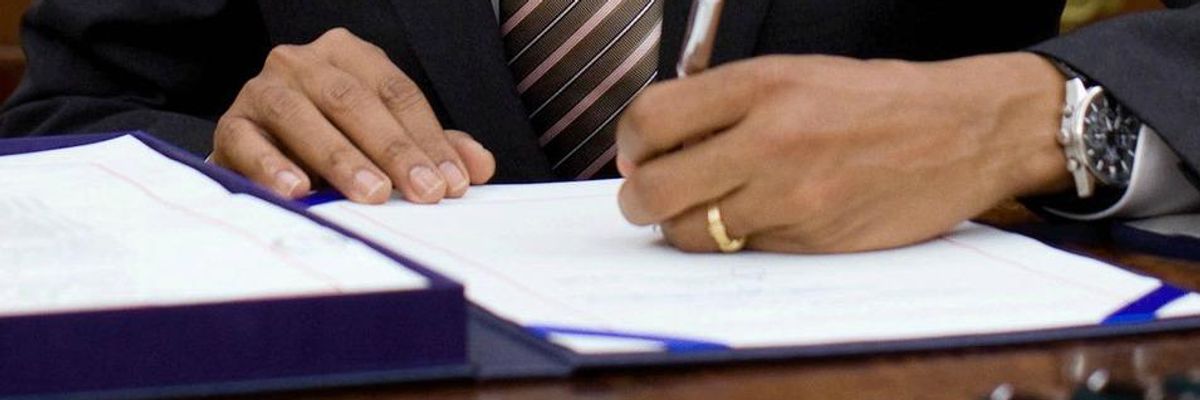

SUBSCRIBE TO OUR FREE NEWSLETTER
Daily news & progressive opinion—funded by the people, not the corporations—delivered straight to your inbox.
5
#000000
#FFFFFF
To donate by check, phone, or other method, see our More Ways to Give page.


Daily news & progressive opinion—funded by the people, not the corporations—delivered straight to your inbox.

President Obama signed the USA Freedom Act into law on Tuesday night after it was approved by the U.S. Senate. (Photo: The White House/Flickr)
On Tuesday, the Senate passed a version of the USA Freedom Act, a bill touted by its authors as surveillance reform that will end the NSA's mass, suspicionless collection of Americans' personal data. Given that parts of the Patriot Act expired on June 1st, and that the government is pretending the expiration is a "crisis" rather than an opportunity, President Obama [signed the bill into law soon after].
While the bill has many significant flaws, the USA Freedom Act vote is also historic: it's the first time since the 1970s that Congress has indicated its intention to restrict the vast powers of intelligence agencies like the NSA, rather than exponentially expand them. It also shows the power that investigative journalism and brave whistleblowing can have on even the most entrenched government interests. Two years ago, debating these modest changes would've been unthinkable, and it is absolutely a vindication for Edward Snowden.
Unfortunately, the bill is also woefully inadequate and largely symbolic, and Congress would've been better off letting Section 215 of the Patriot Act expire permanently. The USA Freedom Act supposedly bans bulk collection of phone records or any other private records, and we certainly hope it actually does. But its provisions are vague and confusing, leading many legal experts to believe they could be re-interpreted in secret--by NSA lawyers with a history of warping the common definitions of ordinary words beyond recognition--and could lead the FISA court to continue to allow the NSA to collect large quantities of Americans' data in secret. (The administration will shamefully now re-start the phone program that expired on Monday for six months, as allowed under the new law's "transition" period.)
 We Interrupt This Article with an Urgent Message! Common Dreams is a not-for-profit organization. We fund our news team by pooling together many small contributions from our readers. No advertising. No selling our readers' information. No reliance on big donations from the 1%. This allows us to maintain the editorial independence that our readers rely on. But this media model only works if enough readers pitch in.  |
The ultra-secret FISA court, a Kafkaesque nightmare for civil liberties, also gets to keep many of its worst features, with just minor changes around the edges. Such an anathema to democracy should be dismantled entirely.
The USA Freedom Act also does not touch on two of the NSA's most powerful and controversial tools: the FISA Amendments Act and Executive Order 12333, which have been used to scan untold billions of emails coming in and out of the United States, and give the agency free rein to spy on 95% of the world's population with virtually no restrictions.
And perhaps most shamefully, given that Congress never would've even had this debate without Edward Snowden, the bill does nothing for whistleblowers who can be prosecuted as spies under the Espionage Act for speaking to journalists and telling the American public the truth.
As Snowden himself said two weeks ago, we hope the USA Freedom Act is just the beginning of Congress' reform of the NSA, and not the end. And we are reminded that it took more than five years for the Church Committee's intelligence reforms to make their way through Congress in the 1970s.
It's also important to remember that given the dysfunction in Congress on all subjects, plus the grip the intelligence agencies have over the legislative committees that supposedly oversee them, new laws constraining the NSA were only ever going to be one part of a much larger picture. Far more substantive changes have happened on the individual level, as well as at many of the nation's largest tech companies, and in the courts.
Encryption is now a legitimate bulwark against mass surveillance by any government. Open-source and free software projects are both getting easier to use for ordinary users and are proliferating in numbers. Once collaborators with the NSA, big tech companies have also taken a far more adversarial position since their secret capitulations were exposed. These companies have at least partially responded to demand from citizens to protect their communications with encryption that can prevent intelligence agencies from spying on innocent people.
While companies like Apple have made great strides by encrypting iPhones by default, a lot more needs to be done to make sure end-to-end encryption--whether we are emailing, texting, or calling each other--becomes the norm in 21st century society. Continued pressure from the public will get us there.
Edward Snowden's leaks have also opened the door to more court challenges. For years the government was able to hide behind procedural maneuvers, like invoking standing or the state secrets privilege, to prevent judges from ruling on the constitutionality of the programs. As the Second Circuit's landmark opinion ruling NSA mass surveillance of Americans illegal, this tactic is slowly crumbling. While it remains an uphill climb for anyone to challenge the government's actions, whistleblowers like Snowden and others are breaking down that wall.
We hope that all of these actions--in Congress, in the courts, and from the public--will continue to become stronger and bring permanent reform in the months and years to come.
Trump and Musk are on an unconstitutional rampage, aiming for virtually every corner of the federal government. These two right-wing billionaires are targeting nurses, scientists, teachers, daycare providers, judges, veterans, air traffic controllers, and nuclear safety inspectors. No one is safe. The food stamps program, Social Security, Medicare, and Medicaid are next. It’s an unprecedented disaster and a five-alarm fire, but there will be a reckoning. The people did not vote for this. The American people do not want this dystopian hellscape that hides behind claims of “efficiency.” Still, in reality, it is all a giveaway to corporate interests and the libertarian dreams of far-right oligarchs like Musk. Common Dreams is playing a vital role by reporting day and night on this orgy of corruption and greed, as well as what everyday people can do to organize and fight back. As a people-powered nonprofit news outlet, we cover issues the corporate media never will, but we can only continue with our readers’ support. |
On Tuesday, the Senate passed a version of the USA Freedom Act, a bill touted by its authors as surveillance reform that will end the NSA's mass, suspicionless collection of Americans' personal data. Given that parts of the Patriot Act expired on June 1st, and that the government is pretending the expiration is a "crisis" rather than an opportunity, President Obama [signed the bill into law soon after].
While the bill has many significant flaws, the USA Freedom Act vote is also historic: it's the first time since the 1970s that Congress has indicated its intention to restrict the vast powers of intelligence agencies like the NSA, rather than exponentially expand them. It also shows the power that investigative journalism and brave whistleblowing can have on even the most entrenched government interests. Two years ago, debating these modest changes would've been unthinkable, and it is absolutely a vindication for Edward Snowden.
Unfortunately, the bill is also woefully inadequate and largely symbolic, and Congress would've been better off letting Section 215 of the Patriot Act expire permanently. The USA Freedom Act supposedly bans bulk collection of phone records or any other private records, and we certainly hope it actually does. But its provisions are vague and confusing, leading many legal experts to believe they could be re-interpreted in secret--by NSA lawyers with a history of warping the common definitions of ordinary words beyond recognition--and could lead the FISA court to continue to allow the NSA to collect large quantities of Americans' data in secret. (The administration will shamefully now re-start the phone program that expired on Monday for six months, as allowed under the new law's "transition" period.)
 We Interrupt This Article with an Urgent Message! Common Dreams is a not-for-profit organization. We fund our news team by pooling together many small contributions from our readers. No advertising. No selling our readers' information. No reliance on big donations from the 1%. This allows us to maintain the editorial independence that our readers rely on. But this media model only works if enough readers pitch in.  |
The ultra-secret FISA court, a Kafkaesque nightmare for civil liberties, also gets to keep many of its worst features, with just minor changes around the edges. Such an anathema to democracy should be dismantled entirely.
The USA Freedom Act also does not touch on two of the NSA's most powerful and controversial tools: the FISA Amendments Act and Executive Order 12333, which have been used to scan untold billions of emails coming in and out of the United States, and give the agency free rein to spy on 95% of the world's population with virtually no restrictions.
And perhaps most shamefully, given that Congress never would've even had this debate without Edward Snowden, the bill does nothing for whistleblowers who can be prosecuted as spies under the Espionage Act for speaking to journalists and telling the American public the truth.
As Snowden himself said two weeks ago, we hope the USA Freedom Act is just the beginning of Congress' reform of the NSA, and not the end. And we are reminded that it took more than five years for the Church Committee's intelligence reforms to make their way through Congress in the 1970s.
It's also important to remember that given the dysfunction in Congress on all subjects, plus the grip the intelligence agencies have over the legislative committees that supposedly oversee them, new laws constraining the NSA were only ever going to be one part of a much larger picture. Far more substantive changes have happened on the individual level, as well as at many of the nation's largest tech companies, and in the courts.
Encryption is now a legitimate bulwark against mass surveillance by any government. Open-source and free software projects are both getting easier to use for ordinary users and are proliferating in numbers. Once collaborators with the NSA, big tech companies have also taken a far more adversarial position since their secret capitulations were exposed. These companies have at least partially responded to demand from citizens to protect their communications with encryption that can prevent intelligence agencies from spying on innocent people.
While companies like Apple have made great strides by encrypting iPhones by default, a lot more needs to be done to make sure end-to-end encryption--whether we are emailing, texting, or calling each other--becomes the norm in 21st century society. Continued pressure from the public will get us there.
Edward Snowden's leaks have also opened the door to more court challenges. For years the government was able to hide behind procedural maneuvers, like invoking standing or the state secrets privilege, to prevent judges from ruling on the constitutionality of the programs. As the Second Circuit's landmark opinion ruling NSA mass surveillance of Americans illegal, this tactic is slowly crumbling. While it remains an uphill climb for anyone to challenge the government's actions, whistleblowers like Snowden and others are breaking down that wall.
We hope that all of these actions--in Congress, in the courts, and from the public--will continue to become stronger and bring permanent reform in the months and years to come.
On Tuesday, the Senate passed a version of the USA Freedom Act, a bill touted by its authors as surveillance reform that will end the NSA's mass, suspicionless collection of Americans' personal data. Given that parts of the Patriot Act expired on June 1st, and that the government is pretending the expiration is a "crisis" rather than an opportunity, President Obama [signed the bill into law soon after].
While the bill has many significant flaws, the USA Freedom Act vote is also historic: it's the first time since the 1970s that Congress has indicated its intention to restrict the vast powers of intelligence agencies like the NSA, rather than exponentially expand them. It also shows the power that investigative journalism and brave whistleblowing can have on even the most entrenched government interests. Two years ago, debating these modest changes would've been unthinkable, and it is absolutely a vindication for Edward Snowden.
Unfortunately, the bill is also woefully inadequate and largely symbolic, and Congress would've been better off letting Section 215 of the Patriot Act expire permanently. The USA Freedom Act supposedly bans bulk collection of phone records or any other private records, and we certainly hope it actually does. But its provisions are vague and confusing, leading many legal experts to believe they could be re-interpreted in secret--by NSA lawyers with a history of warping the common definitions of ordinary words beyond recognition--and could lead the FISA court to continue to allow the NSA to collect large quantities of Americans' data in secret. (The administration will shamefully now re-start the phone program that expired on Monday for six months, as allowed under the new law's "transition" period.)
 We Interrupt This Article with an Urgent Message! Common Dreams is a not-for-profit organization. We fund our news team by pooling together many small contributions from our readers. No advertising. No selling our readers' information. No reliance on big donations from the 1%. This allows us to maintain the editorial independence that our readers rely on. But this media model only works if enough readers pitch in.  |
The ultra-secret FISA court, a Kafkaesque nightmare for civil liberties, also gets to keep many of its worst features, with just minor changes around the edges. Such an anathema to democracy should be dismantled entirely.
The USA Freedom Act also does not touch on two of the NSA's most powerful and controversial tools: the FISA Amendments Act and Executive Order 12333, which have been used to scan untold billions of emails coming in and out of the United States, and give the agency free rein to spy on 95% of the world's population with virtually no restrictions.
And perhaps most shamefully, given that Congress never would've even had this debate without Edward Snowden, the bill does nothing for whistleblowers who can be prosecuted as spies under the Espionage Act for speaking to journalists and telling the American public the truth.
As Snowden himself said two weeks ago, we hope the USA Freedom Act is just the beginning of Congress' reform of the NSA, and not the end. And we are reminded that it took more than five years for the Church Committee's intelligence reforms to make their way through Congress in the 1970s.
It's also important to remember that given the dysfunction in Congress on all subjects, plus the grip the intelligence agencies have over the legislative committees that supposedly oversee them, new laws constraining the NSA were only ever going to be one part of a much larger picture. Far more substantive changes have happened on the individual level, as well as at many of the nation's largest tech companies, and in the courts.
Encryption is now a legitimate bulwark against mass surveillance by any government. Open-source and free software projects are both getting easier to use for ordinary users and are proliferating in numbers. Once collaborators with the NSA, big tech companies have also taken a far more adversarial position since their secret capitulations were exposed. These companies have at least partially responded to demand from citizens to protect their communications with encryption that can prevent intelligence agencies from spying on innocent people.
While companies like Apple have made great strides by encrypting iPhones by default, a lot more needs to be done to make sure end-to-end encryption--whether we are emailing, texting, or calling each other--becomes the norm in 21st century society. Continued pressure from the public will get us there.
Edward Snowden's leaks have also opened the door to more court challenges. For years the government was able to hide behind procedural maneuvers, like invoking standing or the state secrets privilege, to prevent judges from ruling on the constitutionality of the programs. As the Second Circuit's landmark opinion ruling NSA mass surveillance of Americans illegal, this tactic is slowly crumbling. While it remains an uphill climb for anyone to challenge the government's actions, whistleblowers like Snowden and others are breaking down that wall.
We hope that all of these actions--in Congress, in the courts, and from the public--will continue to become stronger and bring permanent reform in the months and years to come.